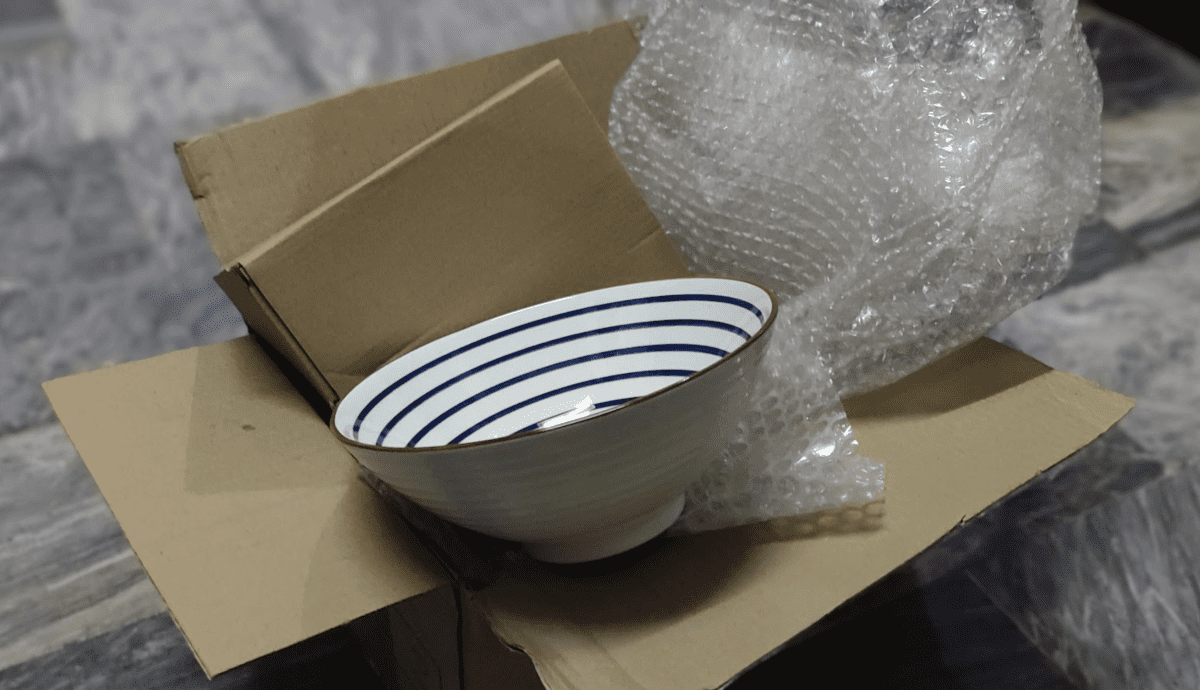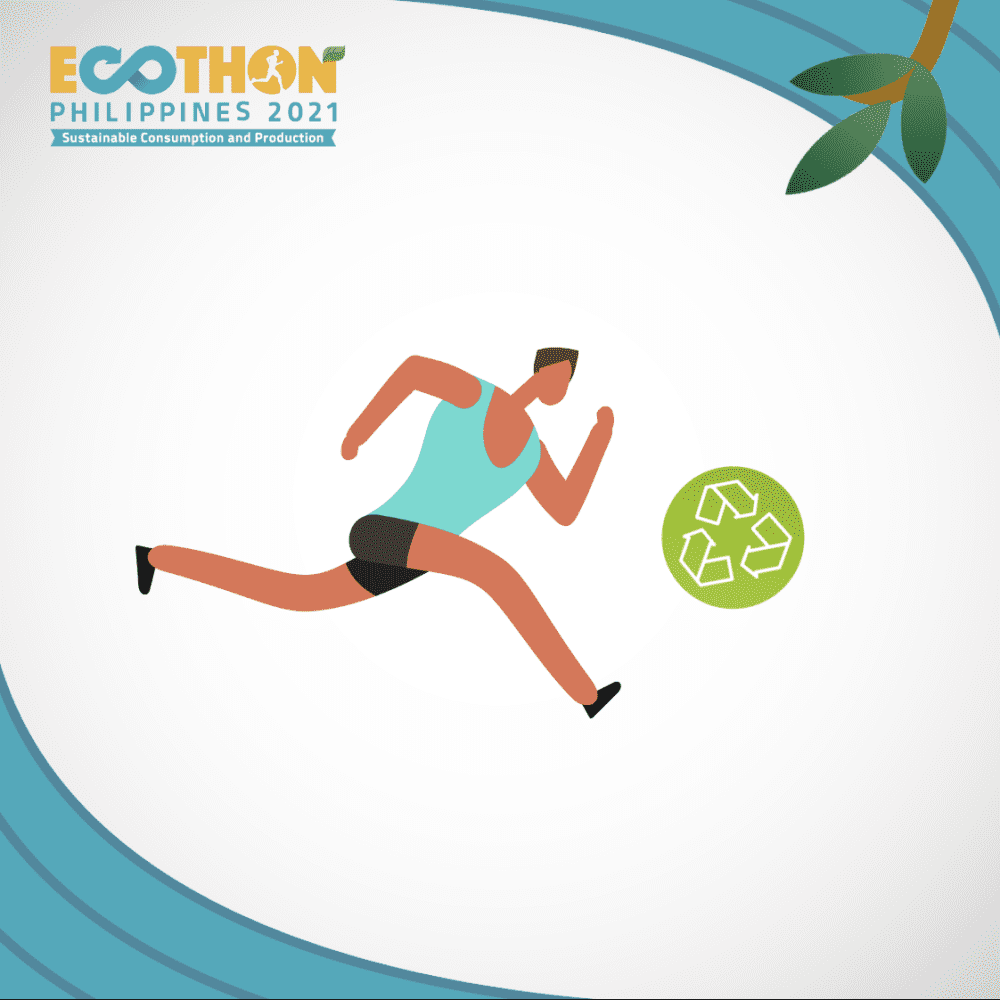by Vince Manglicmot
“Tao po, delivery po!”
The delivery rider was just outside our gate. My delivery for a ceramic bowl had just arrived, as I had broken a glass bowl a few weeks ago. I bought only one as I was too frugal to buy another.
As soon as I got the package, I unpacked it immediately. Inside was a bunch of bubble wrap covering my one ceramic bowl. In fact, the bowl hardly took any space. It was just a box, inside a box, wrapped with so much bubble wrap. As soon as I saw that, I knew my package was secure. It was a job well done for the seller as they ensured the safety of my package, considering its fragility.
However, as I look at the number of materials used just to deliver one ceramic bowl, I felt guilty. For the delivery of one ceramic bowl, a lot of waste products were generated – the plastic bag, two boxes, and multiple layers of bubble wrap. There was just too much waste.

A box of trash for one ceramic bowl.
If we multiply this much waste generated for each Filipino, then there is much to be concerned about. In fact, the Philippines generates 14.66 million tons of trash a year. Massive waste generation coupled with poor waste management contributes to ongoing issues such as climate change and environmental degradation. Is there a better way to go? Maybe there is.
Economic progress and environmental sustainability do not have to be inverse with one another. By pursuing sustainable consumption and production (SCP), there is a way we can choose both.
SCP – are we ready for it?
United Nations Environment Programme defines SCP as a holistic approach to minimising the negative environmental impacts from consumption and production systems while promoting quality of life for all. SCP is doing more while using less – more products made, but with less resources and energy used. SCP is more or less a lifestyle – a lifestyle that improves the quality of life without compromising the environment.
SCP revolves around the concept of a circular economy and eco-innovation. A Circular Economy is the opposite of a linear economy, whereas the former aims to correct, or at least minimize, the problem with the latter. A circular economy is a restorative system that replaces the end-of-life cycle, as what is being done in a linear economy, and promotes renewable energy and the elimination of waste. Most people are familiar with these through policies promoting the 3Rs – Reduce, Reuse, and Recycle.
Another important concept for SCP is Eco-innovation, which is about rethinking business strategies and models which mainstream sustainability throughout all business operations across the value chain. Equally important is the continuous improvement and growth of existing products, models, and systems towards a circular economy, eco-innovation allows that. By continuously reshaping our system towards a more responsible and sustainable lifestyle through innovative products, models, and policies, we can fulfill our goal towards the successful achievement of the SDGs and our goal for a better sustainable future. An example of an eco-innovation in the Philippines is Candid Clothing who uses factory surplus fabric, and upcycles accessories from fabric scraps. Another is SIP PH whose model is to promote conscious consumption and champion waste management in the Philippines by curating and selling eco-friendly, sustainable products.
[Learn more: The Future is Sustainable: How Startups Practice Sustainable Consumption & Production (SCP) in the Philippines]
SCP is beneficial for everybody. By promoting a responsible lifestyle, and sustainable production, we are creating a cost-effective world where we promote economic growth without compromising the environment.
Producers can make better products while consuming less resources, less energy, and producing less waste. In fact, some international big businesses have also shifted towards renewable energy and have also invested in a climate change plan and business model. With more and more corporations investing in renewable energy, sustainable energy sources like solar and hydroelectric power have become more affordable, efficient, and accessible. In the Philippines, there are many companies shifting towards the use of renewable energy. Through SCP, we can reduce costs for businesses. Consumers can also benefit from SCP as they can live a more sustainable lifestyle. Less costs for producers also translate into less costs for consumers.
Our environmental concerns on having too much waste or the issue of climate change can be mitigated through the successful implementation of SCP worldwide. However, as of now, SCP is still not prevalent despite its numerous benefits. There is a need for more eco-warriors in the form of sustainable producers and responsible consumers.
SCP – go for it!
I, myself, also need to rethink my current lifestyle as a consumer. Looking back at my ceramic bowl and box of trash, I think I could have been wiser with my online shopping tendencies. Next time, I could buy from the local grocery store instead to minimize packaging and delivery wastes or only buy from businesses who do sustainable practices. The shift towards SCP doesn’t have to be drastic immediately. We can pursue sustainable consumption through baby steps like buying local products, buying only what is needed, or supporting products from businesses offering sustainable alternatives, to name a few. One day these baby steps can turn into a lifestyle and an advocacy.
But I also think that maybe the producers and businesses can also think of better ways to package and deliver products. Sustainability cannot be placed only on the side of consumers. As a famous idiom goes, “it takes two to tango”. Producers must also think of ways to pursue sustainability. Thus, SCP, for it to work, needs both consumers and producers to be responsible.
In line with this, the Korean Ministry of SMEs and Startups, ASEM SMEs Eco-Innovation Center, Department of Trade and Industry-Philippines, and Philippine Development Foundation, with the support of Hanns Seidel Foundation, organized Ecothon.
Ecothon is a 36-hour intensive boot-camp and business model competition for young eco-entrepreneurs. The program seeks to foster eco-entrepreneurship and to contribute to the fulfillment of the SDGs by developing sustainable business models that minimize environmental impact. As of writing, Ecothon has been successfully launched in Cambodia, Lao PDR, and Myanmar.
If you have a great sustainable idea, product, or innovation, or if you’re an eco-entrepreneur who wants to grow, join Ecothon. Your ideas and innovation may be what the world needs right now.
Interested in joining Ecothon in the Philippines?
Learn more here:
FB: www.facebook.com/ecothonph
Website: www.ecothon.net/visit-each-countrys-website/ecothon-in-philippines
